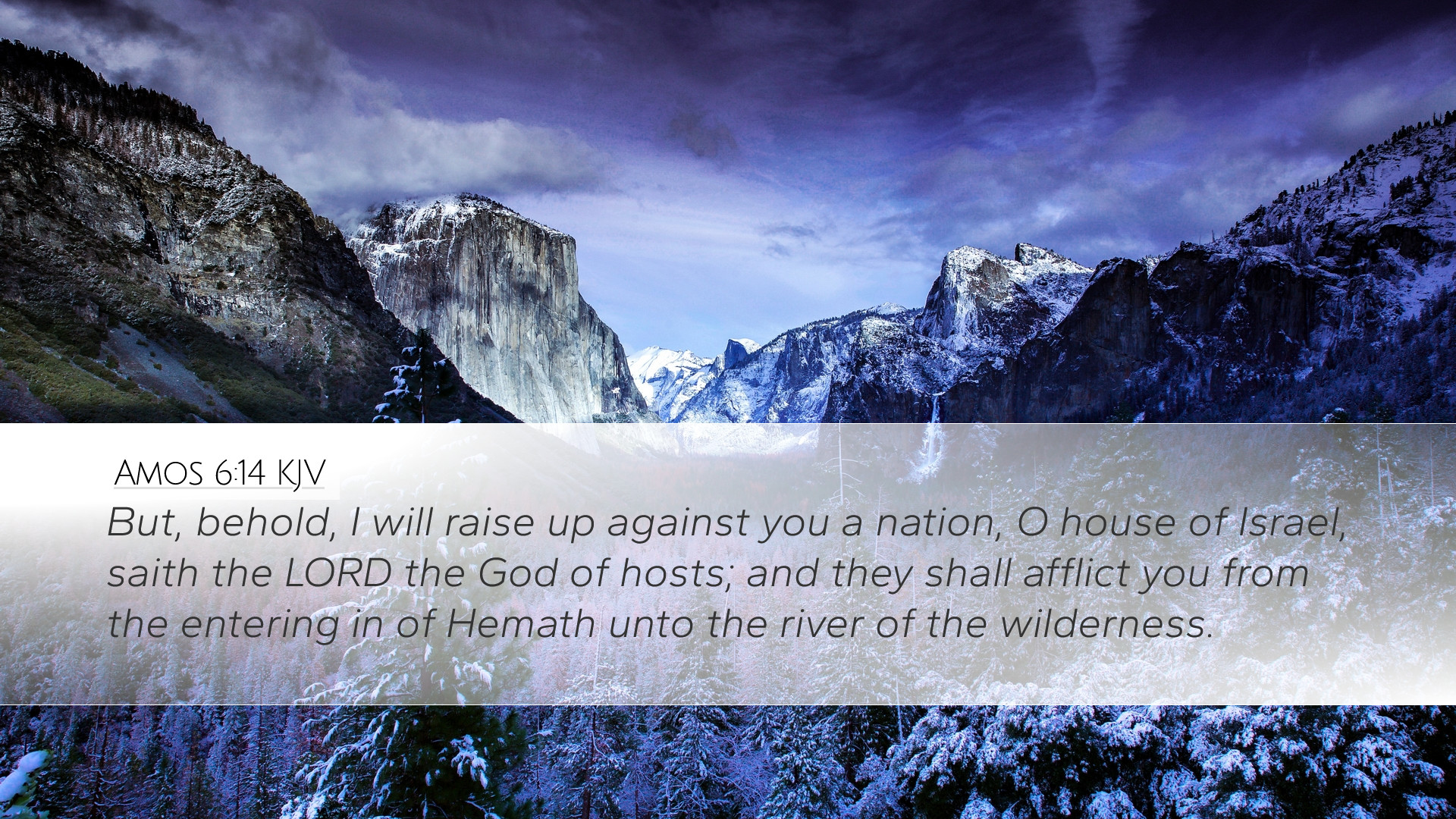Old Testament
Genesis Exodus Leviticus Numbers Deuteronomy Joshua Judges Ruth 1 Samuel 2 Samuel 1 Kings 2 Kings 1 Chronicles 2 Chronicles Ezra Nehemiah Esther Job Psalms Proverbs Ecclesiastes Song of Solomon Isaiah Jeremiah Lamentations Ezekiel Daniel Hosea Joel Amos Obadiah Jonah Micah Nahum Habakkuk Zephaniah Haggai Zechariah MalachiAmos 6:14
Amos 6:14 KJV
But, behold, I will raise up against you a nation, O house of Israel, saith the LORD the God of hosts; and they shall afflict you from the entering in of Hemath unto the river of the wilderness.
Amos 6:14 Bible Commentary
Commentary on Amos 6:14
Verse: "But, behold, I will raise up against you a nation, O house of Israel, saith the LORD God of hosts; and they shall afflict you from the entering in of Hemath unto the river of the wilderness."
Contextual Analysis
This verse is situated within a broader prophetic oracle of Amos, where the prophet speaks against the complacency and corruption of Israel. In chapter 6, the prophet illustrates the false sense of security among the Israelites, who, while indulging in luxury and self-satisfaction, ignore the impending judgment from God due to their moral decay and oppression of the poor.
Interpretation
Amos 6:14 serves as a pivotal warning of divine judgment. The phrase "I will raise up against you a nation" suggests an external threat that will arise due to God's displeasure. Scholars and theologians properly note that Assyria and later Babylon are implied as the agents of this impending affliction.
Key Themes
- Divine Judgment: The text highlights God's sovereign role in raising nations to execute judgment. It shows that God is not merely passive but actively involved in the historical turmoil faced by Israel.
- Hope and Warning: While it is a warning, it underscores the reality that there is a choice—repentance could steer them away from this impending disaster.
- Geographical Significance: The mention of “from the entering in of Hemath unto the river of the wilderness” delineates a specific region affected, emphasizing that judgment would not be selective but widespread, affecting all realms of their existence.
Theological Implications
From a theological perspective, this verse emphasizes the notion of divine retribution and God’s sovereignty over nations. It raises questions about God’s justice and mercy, prompting scholars to engage with the feelings of fear and hope intertwined in the prophetic message.
Commentary Insights
Below are insights derived from prominent public domain commentaries:
Matthew Henry
Henry posits that the complacency of Israel engendered a form of pride which led them to disregard their spiritual obligations. He emphasizes that the afflictions spoken of in this verse are divinely appointed and serve to bring the nation back to a state of humility and repentance. He asserts that Israel, in their idolatry and indulgence, lost sight of their covenant with God, and the prophecy serves as a stark reminder of the consequences of turning away from divine mandates.
Albert Barnes
Barnes highlights the inevitability of judgment against those who have perverted justice. He asserts that the “nation” raised against Israel refers to Assyria, emphasizing the terror and affliction that would ensue. He also interprets the geographic boundaries mentioned as a metaphor for the comprehensive nature of the judgment, which would leave no part of Israel unscathed. He implores the readers to recognize their sinful behaviors as detrimental not only to themselves but to the entire community.
Adam Clarke
Clarke focuses on the specific regions mentioned and how they signify the comprehensive reign of judgment. His interpretations include historical contexts and parallels from other scripture passages, showcasing God’s consistent pattern of sending warning signs before judgment. He urges that the church today must remain vigilant lest it fall into similar complacency and sin, leading a life detached from the teachings of Christ.
Practical Applications
The message of Amos 6:14 continues to resonate with contemporary audiences, particularly in the following ways:
- Call to Humility: The call to humility before God is paramount; both leaders and congregants should assess their lifestyles against biblical standards, ensuring that complacency does not take root.
- Social Justice: A biblical understanding compels believers to advocate for the marginalized, echoing Amos’s lament over injustice. Believers should strive to be instruments of change in their communities.
- Awareness of Judgment: Understanding that God holds nations accountable encourages a worldview that sees each societal issue as potentially under divine scrutiny and prayer is essential for national repentance and renewal.
Conclusion
Amos 6:14 serves as an important reminder of God’s sovereign authority and the seriousness of sin. This commentary synthesizes insights from classic interpretations, revealing timeless lessons relevant in both personal and communal contexts. As we reflect on this verse, let it inspire us to seek God’s mercy, pursue justice, and maintain an active faith that honors His commandments.


